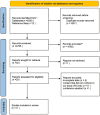Effectiveness of mobile health in symptom management of prostate cancer patients: a systematic review and meta-analysis
- PMID: 40400544
- PMCID: PMC12092381
- DOI: 10.3389/fdgth.2025.1584764
Effectiveness of mobile health in symptom management of prostate cancer patients: a systematic review and meta-analysis
Abstract
Background: Mobile health (mHealth) is an accessible strategy to deliver health information and is becoming increasingly popular as a form of follow-up among medical staff. However, the effects of mobile health on the physical and mental health outcomes of patients with prostate cancer after discharge from the hospital remain unclear. This meta-analysis evaluated the current evidence regarding the effects of mHealth interventions on the outcomes of patients with prostate cancer.
Methods: Four databases (PubMed, Cochrane Central electronic database, EMBASE, and Web of Science) were searched from inception to 8 November 2024 for randomized controlled trials (RCTs) comparing the effects of mobile health vs. usual care on the outcomes of patients with prostate cancer. Pooled outcome measures were determined using random effects models.
Results: In total, 11 RCTs, including 1,368 patients, met the criteria for inclusion in this meta-analysis. The meta-analysis revealed a significant effect of mHealth interventions on long-term bowel function outcomes (standard mean difference = 0.19, 95% confidence interval = 0.01-0.37, P = 0.04, I2 = 0.00%) compared with the usual standard care or no mHealth. However, no significant differences were observed in the following outcomes: short-term and long-term effects on anxiety, depression, self-efficacy, psychological distress, and urinary and hormonal function, and short-term effects on bowel function.
Conclusions: mHealth interventions can significantly improve long-term bowel function outcomes. However, more research is needed to confirm other physical and mental health outcomes.
Systematic review registration: https://www.crd.york.ac.uk/prospero/, PROSPERO (CRD420250651320).
Keywords: long-term effects; meta-analysis; mobile health (mHealth); prostate cancer; short-term effects; symptom management.
© 2025 Chen, He, Lin, Zhang, Li and Li.
Conflict of interest statement
The authors declare that the research was conducted in the absence of any commercial or financial relationships that could be construed as a potential conflict of interest.
Figures
Similar articles
-
Effectiveness of holistic mobile health interventions on diet, and physical, and mental health outcomes: a systematic review and meta-analysis.EClinicalMedicine. 2023 Nov 18;66:102309. doi: 10.1016/j.eclinm.2023.102309. eCollection 2023 Dec. EClinicalMedicine. 2023. PMID: 38053536 Free PMC article.
-
Mobile Health Technology Interventions for Suicide Prevention: Systematic Review.JMIR Mhealth Uhealth. 2020 Jan 15;8(1):e12516. doi: 10.2196/12516. JMIR Mhealth Uhealth. 2020. PMID: 31939744 Free PMC article.
-
Behavioural modification interventions for medically unexplained symptoms in primary care: systematic reviews and economic evaluation.Health Technol Assess. 2020 Sep;24(46):1-490. doi: 10.3310/hta24460. Health Technol Assess. 2020. PMID: 32975190 Free PMC article.
-
Effectiveness of Mobile App Interventions to Improve Periodontal Health: Protocol for a Systematic Review and Meta-Analysis.JMIR Res Protoc. 2024 Jul 31;13:e50479. doi: 10.2196/50479. JMIR Res Protoc. 2024. PMID: 39083769 Free PMC article.
-
Mobile apps to reduce depressive symptoms and alcohol use in youth: A systematic review and meta-analysis: A systematic review.Campbell Syst Rev. 2024 Apr 26;20(2):e1398. doi: 10.1002/cl2.1398. eCollection 2024 Jun. Campbell Syst Rev. 2024. PMID: 38680950 Free PMC article. Review.
References
Publication types
LinkOut - more resources
Full Text Sources
Miscellaneous





